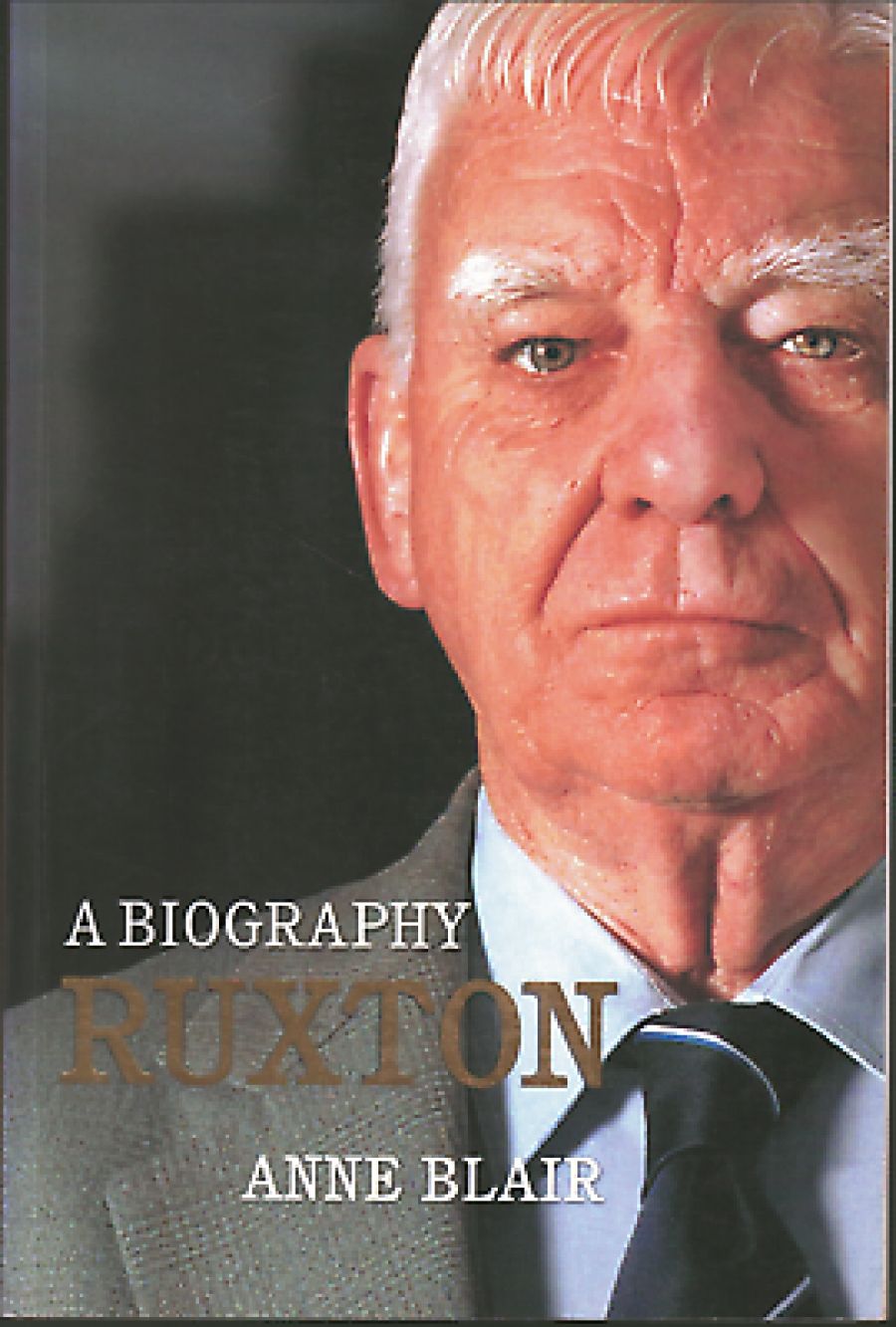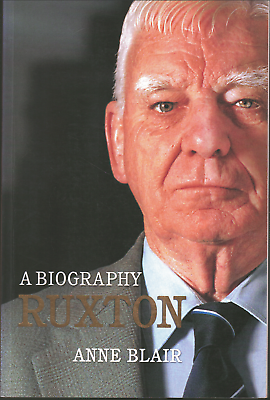
- Free Article: No
- Contents Category: Biography
- Review Article: Yes
- Article Title: Battling Bruce
- Online Only: No
- Custom Highlight Text:
For more than twenty years, Bruce Ruxton was Victorian president of the RSL, and one of the best-known names in Australia. ‘Best-known’ does not necessarily mean ‘best-loved’; few public figures cut so clear a chasm between supporters and detractors. Knowing Ruxton well over many years, let me declare that on the day I meet another man who equals him for kindness of heart and dedication to the welfare of others, I’ll take my hat off to the second man, too.
- Book 1 Title: Ruxton
- Book 1 Subtitle: A biography
- Book 1 Biblio: Allen & Unwin, $29.95 pb, 308 pp
- Book 1 Cover Small (400 x 600):

- Book 1 Cover (800 x 1200):

Anne Blair’s slender volume outlines Ruxton’s life, highlighting most of the outstanding characteristics and quirks of this extraordinary man. Centre-stage is his devotion to the interest of ex-service people and their dependants: two decades of unsalaried work, sometimes seven days a week, available, if needed, twenty-four hour a day.
Before Ruxton, the RSL seemed to be a declining force. Then the media discovered an unfailing fountain of pungent one-liners – sharp opinions that many shared but most were too shy to shout. Blair herself was in Ruxton’s office when a journalist asked whether veterans should receive Viagra at government cost. ‘Yes, of course! I could do with some right now myself!’ Ruxton milked the media with the skill of Bob Hawke or Paul Keating.
As passing time altered the ‘demographic’ of the veterans, Ruxton presided over a basic RSL orientation from war pensions and medical treatment to welfare and old age. His grasp of veteran legislation and procedure was awe-inspiring, and his relations with successive ministers for veterans’ affairs could be a benchmark for all aspiring lobbyists – not aloof, but not too affable. Most ministers seemed actually to like him, though never unaware of his underlying formidable political clout. Here, Blair is particularly interesting, as she analyses his methods, demonstrating his indefatigable personal activity at the local level: mayors and municipal councillors, Rotary presidents, yacht club commodores, football and golf club presidents, country newspaper editors, regional radio broadcasters. As he himself put it, a member of parliament, when in Canberra, might seem to stand ten metres high; on his local electorate patch, where the votes must be garnered, he stood one metre tall.
The RSL had also to decide whether it should confine itself solely to veterans’ matters, or whether it should adopt a public stance on wider affairs: migration; the republic; women serving in combat units; homosexuals in the forces. Upon such questions, the nation often received the benefit of Ruxton’s firm opinions.
Blair’s book suggests the wisdom of second thoughts on what are widely accepted as parts of the Ruxton stereotype. A larrikin? But just observe his perfect natural dignity and command on any solemn occasion, whether public ceremony or private grief. Redneck racist? How to explain his happy photograph with his five personal staff, two of them Asians? And his successful support for immigration to Australia of the Hong Kong Ghurkhas? And his many house guests of every race and colour in the world, including Japanese? Male chauvinist? What? This close personal friend of Germaine Greer? You might as well try to pick up a drop of quicksilver in your bare fingers as to stick labels on Bruce Ruxton.
From an author who has had access to Ruxton’s superb and massive personal archive, the book is meagre. A little over 30,000 words, its 208 pages are ‘bumped out’ by spacious typesetting, including ten wholly blank pages. The entire scholarly apparatus comprises twenty-two footnotes; of the twelve chapters, six offer no detailed authentication at all. Many details are wrong: Melbourne Lord Mayor Alwynne Rowlands is called ‘Rollins’; leading Melbourne magistrate Gerkens was not a judge, and was famously known (to himself as to others) as Murray Gerkens (not ‘Maurice’;) orangutans, at just over a metre tall, are hardly ‘great beasts’ (is she thinking of gorillas?); the High Court of Australia does not advise governments on the formulation of new laws; commanding officers do not ‘issue’ decorations; knights are created by the monarch, not by the prime minister. And so it goes.
But we should gratefully acknowledge the prompt appearance of such an early study. It will surely hold the door of memory ajar for a great Australian whose full biography will certainly one day appear.


Comments powered by CComment